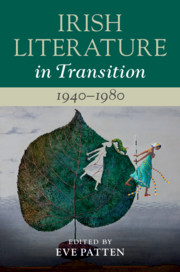Book contents
- Irish Literature in Transition, 1940–1980
- Irish Literature in Transition
- Irish Literature in Transition, 1940–1980
- Copyright page
- Contents
- Contributors
- Series Preface
- General Acknowledgements
- Introduction
- Part I After the War: Ideologies in Transition
- Part II Genres in Transition
- Part III Sex, Politics and Literary Protest
- Chapter 9 Censorship, Law and Literature
- Chapter 10 Sex, Dissent and Irish Fiction: Reading John McGahern
- Chapter 11 History, Memory and Protest in Irish Theatre
- Chapter 12 Violence, Politics and the Poetry of the Troubles
- Part IV Identities and Connections
- Part V Retrospective Frameworks: Criticism in Transition
- Index
Chapter 12 - Violence, Politics and the Poetry of the Troubles
from Part III - Sex, Politics and Literary Protest
Published online by Cambridge University Press: 28 February 2020
- Irish Literature in Transition, 1940–1980
- Irish Literature in Transition
- Irish Literature in Transition, 1940–1980
- Copyright page
- Contents
- Contributors
- Series Preface
- General Acknowledgements
- Introduction
- Part I After the War: Ideologies in Transition
- Part II Genres in Transition
- Part III Sex, Politics and Literary Protest
- Chapter 9 Censorship, Law and Literature
- Chapter 10 Sex, Dissent and Irish Fiction: Reading John McGahern
- Chapter 11 History, Memory and Protest in Irish Theatre
- Chapter 12 Violence, Politics and the Poetry of the Troubles
- Part IV Identities and Connections
- Part V Retrospective Frameworks: Criticism in Transition
- Index
Summary
This chapter re-examines the poetry of the early Troubles and addresses the limitations of what was, to a large extent, an atrocity-led literature, drawing on works such as Thomas Kinsella’s ‘Butcher’s Dozen’ and Seamus Deane’s ‘After Derry’ to reassess the role played by writers and critics at this time. Discussing both retrospective and contemporaneous interviews with authors, the chapter also addresses the ways in which writers such as Seamus Heaney, Derek Mahon and Michael Longley responded to the new mandate which poetry had been given after the outbreak of the northern conflict, with the relentless media exposure of the Troubles often, but not always, eliciting evasive responses to the conditions engendered by the violence. Finally, it examines the fresh formal and linguistic strategies adopted by younger poets including Ciaran Carson, Paul Muldoon and Medbh McGuckian. By this time, writing the violence of the Troubles into poetry could make evasion a form of engagement which helped to preserve artistic autonomy.
Keywords
- Type
- Chapter
- Information
- Irish Literature in Transition, 1940–1980 , pp. 216 - 232Publisher: Cambridge University PressPrint publication year: 2020
- 1
- Cited by



